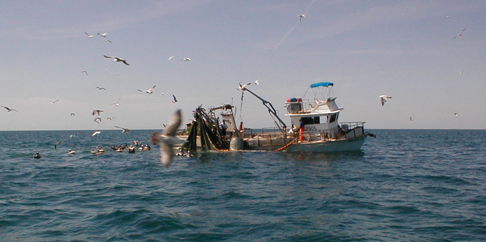A Short history of bait fish in the Tampa Bay area.
In 1970 the fishing in the eastern Gulf was fantastic. The mullet were prolific all over the Tampa Bay area. Kingfish were large and numerous in the spring and fall and there were so many grouper in shallow water that they were considered a nuisance fish during kingfish season. There were such large schools of Spanish sardines, scaled sardines, threadfin herring, and menhaden that you could seemingly walk on them from one side of Tampa Bay to the other. It was common to collect your bait for a day's fishing by simply motoring outside Pass-a-Grille pass or John's Pass and looking for either birds or a mud boil, throwing a cast net into the middle of them and going fishing, all within a few minutes. There was never any problem finding bait except during the coldest part of winter. We also, at that time, had the largest nesting population of brown pelicans in the entire country.
In 1970-1971 the state legislature passed a law prohibiting purse seining in the State of Florida, except somehow Pinellas County was excluded from the prohibition. Recreational fishermen of that time pleaded with the legislature to close Pinellas as well. When Ralph Haben was Speaker of the House he slipped a law in mandating that the purse seiners had to stay 500 yards off the beach, but at the same time he saw to it that Hillsborough and Manatee Counties were opened to the purse seiners as well. 
The law remained this way for many years, until the creation of the Marine Fisheries Commission. At that time recreational fishermen began lobbying the MFC to push the purse seiners out of state waters to bring our three Tampa Bay counties in line with the rest of the state. Throughout the 1980's many recreational fishermen noted the steadily declining populations of all species of bait fish and some noticed the declining population of brown pelicans. The Audubon Society in late 1980 found that the nesting population of brown pelicans in the Tampa Bay area had declined by over 70%. I'm certain this can be directly linked to the collapse of the bait fish populations in the Tampa Bay area. Finally after years of lobbying the MFC, a rule was passed pushing the purse seines out three miles off the beach. This proved to be too little and too late.
Three purse seine boats based in Apollo Beach took all the menhaden from Tampa Bay over a three or four year period prior to the MFC's regulation. They depleted the stocks of menhaden to the point that it was unprofitable to remain in the area, so they moved on to other parts of the country to work. This left only the few purse seine operators in Cortez to continue the decimation of the other bait fish stocks. Spanish sardines were the next to disappear, and they have yet to make a real comeback even now in 2008. The seiners then moved to scaled sardines and caught almost all of them. The only thing left to them was threadfin herring and since both Spanish and scaled sardines are depleted, it remains their primary target even though the price they are paid for threadfin herring is very low.
The year 2000 spring fishing season proved, beyond a doubt, that the bait fish stocks in the Tampa Bay area, both inshore and offshore, had truly collapsed. There should have been huge schools of threadfin herring, scaled sardines and Spanish sardines all over the Tampa Bay area. Many of the bait and tackle shops that sell live baits on the south end of the Bay said that they had never seen it so bad, even during other drought years. Offshore, those of us that had been fishing full time for the last thirty years can attest that the bait stocks had simply collapsed. The 2001 Spring season was even worse. Charter boat captains in other parts of the Gulf told me that there were plenty of bait fish both north of Clearwater and south of Manatee County. This can only mean one thing. The herring and sardine stocks that we should have had in this area were gone. They will not have a chance to rebound until the purse seine industry is dissolved; either with a buyout of the licenses and equipment or simply by making it illegal to purse seine in state waters, as it is in the rest of Florida, or worst case, letting them go bankrupt because there is not enough bait for them to live on.
It is past time for the Fish and Wildlife Commission to help the Tampa Bay area and close our waters to this all-too-efficient method of fishing just as the rest of the state is closed to it. Most of the purse seining is done off south Pinellas County beaches and just outside the mouth of the Bay. There is virtually no enforcement in this area to determine if they are in fact three miles out. Many times purse seiners have been witnessed making sets well inside the three-mile limit and the FMP has declined to investigate. This, coupled with the fact that purse seiners and their spotter aircraft are capable of wiping out our bait populations makes it imperative that they be removed from state waters.
If the bait species are allowed to recover, we will then see an increase in our game fish species, which directly benefits both commercial and recreational fishermen and indirectly benefits the state with the increased tax dollars brought in as recreational fishing effort increases in this area.
An increase in the brown pelican nesting population will not be far behind once the forage fish are allowed to increase in numbers in the Tampa Bay area.
Capt. Charles Walker
ed. note: The MFC was absorbed by the Florida Fish and Wildlife Conservation Commission (FWC) after this article was written. Our bait situation is not appreciably better in 2010 and our fishing for many species has certainly not improved due to total mismanagement by the Gulf of Mexico Fisheries Management Council and the National Marine Fisheries Service. This year, 2010, our fishing rights are under full attack by the far left 'anti-fishing' crowd with the approval and help of the White House administration. Please see all the information on our home page in order to keep up with what is happening.


